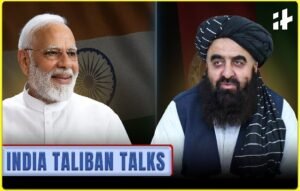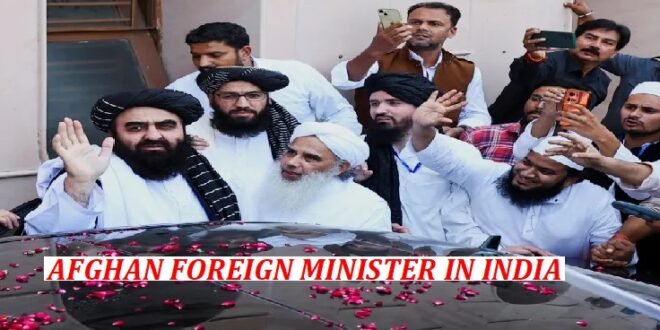15-10-2025
Bureau Report + Agencies
NEW DELHI: As the Taliban returned to power in August 2021 following the chaotic withdrawal of US forces, which triggered the collapse of the Western-backed government in Kabul, India was forced to shut its embassy and hurriedly pull out its diplomats and citizens.
 More than four years later, Prime Minister Narendra Modi’s Hindu nationalist government has rolled out a red carpet for an Afghan delegation led by the Taliban administration’s Foreign Minister Amir Khan Muttaqi in the capital, New Delhi.
More than four years later, Prime Minister Narendra Modi’s Hindu nationalist government has rolled out a red carpet for an Afghan delegation led by the Taliban administration’s Foreign Minister Amir Khan Muttaqi in the capital, New Delhi.
The Afghan foreign minister’s weeklong trip, the first official visit by a Taliban leader, is being billed as groundbreaking. Muttaqi, who remains on the United Nations sanctions list, arrived in India after receiving a temporary travel exemption from the world body.
India’s reset with the Taliban, experts say, is part of a policy of pragmatism, as New Delhi aims to counter Pakistani influence in Afghanistan, whose relationship with Pakistan, India’s arch foe, has been strained over cross-border attacks.
Some analysts, however, say India’s hosting of the Taliban leaders gives legitimacy and a de facto recognition to the Taliban administration, which has been struggling to boost its diplomatic legitimacy.
So, why is India embracing the Taliban now? What happened at their meeting and what is New Delhi expecting from the Taliban? What is in it for the Taliban?
What happened during the India-Taliban meet?
Muttaqi, accompanied by Afghan trade and foreign ministry officials, is meeting Indian officials to discuss diplomatic, trade and economic ties during his visit.
After he met Foreign Minister Subrahmanyam Jaishankar on Friday, New Delhi said it will reopen its embassy in Kabul.
 “Closer cooperation between us contributes to your national development as well as regional stability and resilience,” Jaishankar said. He also affirmed India’s “full commitment to the sovereignty, territorial integrity and independence of Afghanistan”.
“Closer cooperation between us contributes to your national development as well as regional stability and resilience,” Jaishankar said. He also affirmed India’s “full commitment to the sovereignty, territorial integrity and independence of Afghanistan”.
Muttaqi has called India a “close friend”. In a joint statement, New Delhi and the Taliban committed to maintaining “close communication and continue regular engagement”.
The Afghan leaders also invited Indian companies to invest in its mining sector, which the statement said “would help strengthen the bilateral trade and commercial relations”.
New Delhi also stated that it is committed to furthering its humanitarian assistance and other development projects in Afghanistan, one of the world’s poorest countries.
Modi’s government also facilitated Muttaqi’s visit to Deoband, in Uttar Pradesh, which hosts the Darul Uloom Deoband, one of the most influential Islamic seminaries in South Asia.
On Monday, Muttaqi announced that direct flights would soon start between Kabul and Indian cities, including Amritsar in Punjab.
Why is India embracing the Taliban now?
Historically, India has viewed the Taliban as a proxy for Pakistan’s intelligence agencies. Many Taliban members had studied in conservative religious schools in Pakistan, which also provided crucial support to the mujahideen movement against the Soviet Union in the 1980s. It was from the mujahideen that the Taliban emerged.
India shuttered its Kabul embassy in 1996 when the Taliban first took control of Afghanistan.
 Pressmediaofindia
Pressmediaofindia




